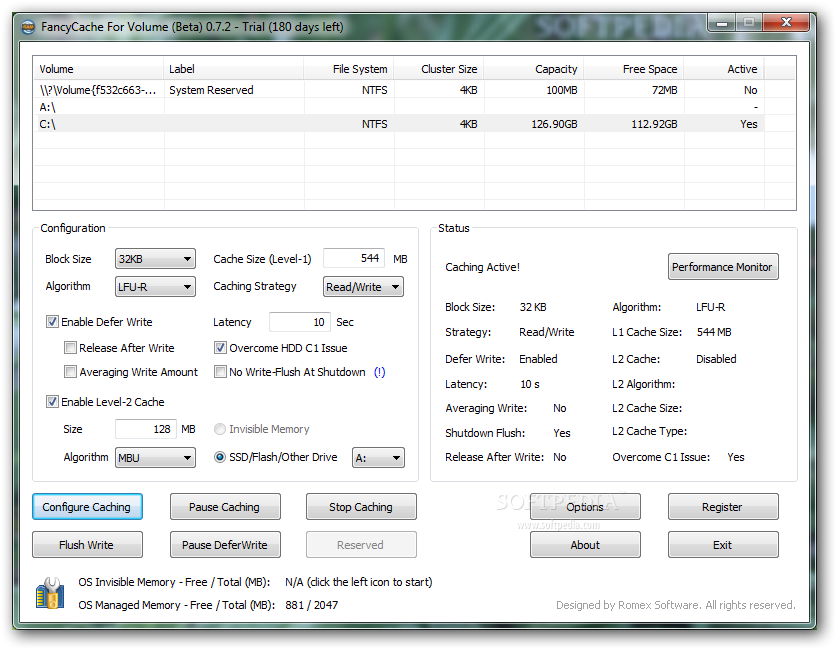Fancycache Ключ
FancyCache is a supplementary software caching scheme that cooperates with system memory to provide data caching for volumes/disks. You may want to check out more software, such as Advanced Find and Replace, OpdiTracker or AmoK DelayDel, which might be related to FancyCache.
Products
FancyCache -hard drive block level caching program, usefull for systems with 4GB+ of ram and even more. Free Download FancyCache for Volume 0.8.0 Beta - Virtual Cache for Volumes.
Join GitHub today
GitHub is home to over 40 million developers working together to host and review code, manage projects, and build software together.
Sign upHave a question about this project? Sign up for a free GitHub account to open an issue and contact its maintainers and the community.
By clicking “Sign up for GitHub”, you agree to our terms of service and privacy statement. We’ll occasionally send you account related emails.
Already on GitHub? Sign in to your account
Comments
commented Mar 12, 2013
Requests with a lot of GET args raise MemcachedKeyLengthError. |
Use Cases

commented Mar 12, 2013
This should be easy with a md5 hash. I'll take a look. |
commented Mar 12, 2013
Hopefully fixed now. Please test. |
commented Mar 12, 2013
Thank you. Works fine. What do you think about sorting GET args before cache_key generation? |
commented Mar 12, 2013
Hmm... perhaps an option. I think you could at least do that with the |

So I am in no way affiliated with this program or the developers... I am just a happy consumer that wanted to share my experience.
First here are the details of my machine:
i5-3570k at 4.0ghz
8gb DDR3
Radeon HD-7870 1ghz
1tb WD black HDD (slow as shit... the point of all this)
Trying to find a way to maximize my memory usage and minimize loading times in games I tried a program called FancyCache. I didn't expect much since I am fully aware of how windows 7 implements it's own form of intelligent caching called superfetch.
I set this program up for disk read caching only using the 'least frequently used' (LFU) caching algorithm and gave it 1gb of my RAM dedicated for this purpose. For the first several hours I saw almost no results whatsoever, less than 1% reduction in disk read accesses. I stopped paying attention to it until just now because I was at the 24 hour mark. In the mean time I've been browsing the internet, playing Skyrim, FarCry 3, and WoW. Here are the results:
So you can see that this reduced disk reads by 68% overall, allowing 40gb of 68gb to be read directly from RAM rather than from the HDD (at about 100x the speed). I noticed this, which is the most important thing. In all three games that I have played over these 24 hours I have noticed significantly faster loading times.
Note that I did not mess with windows superfetch in any way. I've seen people talking about disabling it when using this but I think that is stupid. Superfetch was not using all of my RAM anyway, leaving 1.5gb to 2gb of it underutilized. I figure that operating this caching program in addition to superfetch (using the memory that superfetch doesn't use anyway) is the ideal configuration.
I'll be doing more testing this week, but right now I recommend this to anyone, especially those of you who don't have SSD's yet and have 8gb or more memory.
You might be wondering why I am only doing read caching... well because write caching scares the shit out of me in that you can lose all write-deferred data if your computer crashes or your power goes out, and also because it is less useful for gaming (would really only help speed up game save writes).
Here is my memory utilization. You can see superfetch is still using over 3gb, and I only have 70mb(!) free. This is ideal, you don't want any memory free, you payed for it, it should always be in use to speed up your computer! On the occasion that a new application needs RAM superfetch's 'standby' memory will be surrendered to it, without paging it to the disk, so there is no performance hit to having all of your memory utilized in this way, only benefit.
(yes, chrome is using a shitload!)